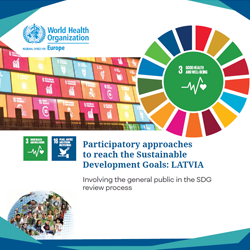Latvia. Involving the general public in the SDG review process (2019)

Download
In the 1990s, soon after the country became independent, Latvia decided to launch an initial environmental policy with the aim of balancing economic and social processes related to environmental needs. In 2002, Latvia enacted its strategy for sustainable development based on the Latvian National Report “Rio + 10” to the World Summit on Sustainable Development in Johannesburg. In 2006, following a review of the European Union’s Sustainable Development Strategy, Latvia began a participatory sustainable-development planning process in which citizens were encouraged to express their vision of Latvia in 2030 as regards all dimensions of sustainability. This resulted in Parliament’s approval of the Sustainable Development Strategy of Latvia until 2030 (Latvia 2030) in 2010. Because of the extensive involvement of the public in discussions about the country’s future, Latvia 2030 is sometimes referred to as a “social contract”. The Government’s planning system places achieving Latvia 2030 as the overarching goal of the 7-year mid-term national development plans. The current National Development Plan of Latvia for 2014–2020 ensures a hierarchy of performance indicators that are operationalized in sectoral or multisectoral policy documents down to the activity level.
While Latvia mainstreams targets for implementing the 17 SDGs in its policy, this briefing focuses specifically on SDG 16 (promote peaceful and inclusive societies for sustainable development, provide access to justice for all and build effective, accountable and inclusive institutions at all levels) with a focus on participation. It showcases the participatory process put in place in government planning, and the contribution of public participation to the SDG review process.



